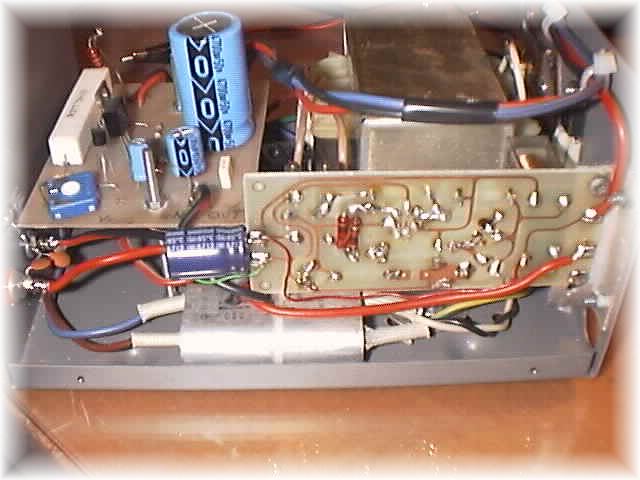
STABILIZED AND SECURE POWER SUPPLY

yet an other one? Yes.
It's a stabilized power supply (13V variable-5A) with protection for short cut
and high output voltage;
It was born because I needed a "secure" power supply for all my
TNC-modems (RF feedback, short-cut,high voltage etc.);
Schematics cames from an italian magazine - Nuova Elettronica N. 172-173) but I've
made some mods:
Added a 220V input filter;
I've used a 220V bipolar switch;
Added some RF By-pass capacitor in the output;
Added a Ferrite Choke in the output to avoid RF feedback;
Click
here for th original schematics;
Click here for my schematics;
SHORT CUT PROTECTION
It works in this way:
across R3 there's a voltage drop proportional to the current that flow on the
load; the more is the current that flow in the load the more is the voltage drop
across R3;
when this drop is >= 0,6V transistor TR3 will open putting pin R of IC1 at
ground level;
in this way the output voltage will be 0V;
Varing R3 will change the max ampere there can flow before the protection
intervene;
We know that V=RxI,
with R3=0,1 Ohm and 6A on the load the voltage drop across R3 will be
0,1x6=0,6V;
Generally:
A= Max Current before protection intervene;
R= R3 value;
V= for NPN transistor= 0,6-0,7V)
R=0,6/A
so, if we don't want more than 3A in the load:
R=0,6/3=0,2 Ohm
HIGH VOLTAGE PROTECTION (IN THE OUTPUT)
I had some
schematics ready when a friend gave me this board; it uses a rele' to break the
output when the voltage goes up a preset value:
it's not absolutly the best, because rele' are not very fast, but it's work.
Click here for a schematics;
Click here for an other schematics;
AUTOMATIC FAN SWITCHING
This is an
optional, not really necessary, but I had time to spent so....;
It's a simple IC wich compare two voltages: the first is a preset voltage (pin2),
the other comes from an NTC monitoring the temperature of the Transistor (pin 3);
when V1 > V2 the output is high and a fan will switch on;
I suggest to mount the NTC not very closed the Transistor and the fan to avoid
continuos switching of the fun;
It was sunday and had no NTC home so I've used 3 simple diode (1N4148) instead
of NTC with the anode near R6 (R5-R4 in my schematics);
( NB: add a small resistor in series, 2-5 K);
Click
here for schematics using an NTC;
Click here for my
schematics using diodes (bottom-right)
73 de iz7ath Talino